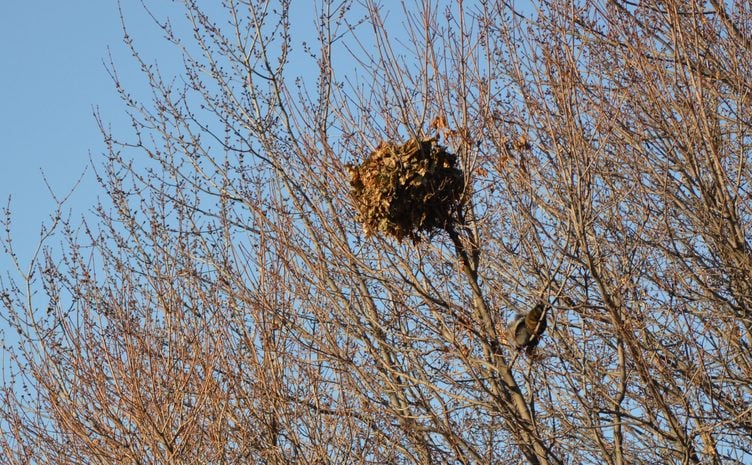Understanding Squirrel Nests and Their Differences from Bird Nests
The idea of birds nesting in our yards is often a heartwarming sight. It suggests that these small creatures feel safe enough to raise their young in our presence. However, not every cluster of twigs and leaves you spot in your trees is necessarily a bird’s nest. Sometimes, what appears to be a bird’s home might actually belong to a squirrel. Learning how to distinguish between the two can help you better understand the wildlife around you.
The Big Ball of Leaves: A Squirrel Nest
During the fall season, it’s common to see large clusters of leaves on tree branches. Many people might assume these are bird nests, but in reality, squirrels also build homes in trees. Alissa Kakatsch, an assistant turkey and pheasant ecologist with the Wisconsin Department of Natural Resources, explains that squirrels construct two types of nests. The first is called a den, which is typically found inside existing structures like tree cavities, boats, or buildings. The second type is known as a drey, which is often seen in trees.
A typical squirrel nest is usually located high up in the trees, ranging from 20 to 35 feet above the ground. These nests are made of twigs, leaves, and softer materials on the inside. If you spot what looks like a massive ball of leaves in the treetops, it’s more likely to be a drey rather than a bird’s nest.
What Does a Squirrel Nest Look Like?
One way to tell the difference between a squirrel nest and a bird’s nest is by examining the size. According to Alissa, while both birds and squirrels may build nests on forked branches, squirrel nests tend to be larger. Additionally, bird nests are often more secluded and hidden, whereas squirrel nests are usually more open and visible in the branches.
Red squirrels typically build their nests in pine trees, while gray squirrels are commonly associated with the dreys found in treetops. Understanding these differences can help you identify the type of wildlife inhabiting your yard.
Squirrel Nesting Behavior
Like many birds, squirrels can have multiple litters per year. They usually nest from spring through fall, and their young remain in the nest for about 12 weeks before they’re ready to leave. Unlike some birds, squirrels do not mate for life, and females raise their young alone. This behavior is essential to consider when thinking about how to manage squirrel populations in residential areas.
Deter Squirrels From Nesting in Your Yard
If you find that squirrels are eating your birdseed or causing other issues, it can be frustrating. However, Alissa strongly advises against relocating or disturbing squirrel nests, especially if there are kits (young squirrels) present. Doing so could harm the young or lead to them being orphaned. She recommends avoiding any interference with nests during the months of March and October, as these are critical times for squirrel activity.
Instead of trying to remove the nests, Alissa suggests using deterrents to keep squirrels away from areas where they might build their homes. Motion-sensor lights can be effective in warning squirrels away, or playing music in the area can serve a similar purpose. Sealing off potential entry points to garages, sheds, and other structures can also prevent squirrels from using them as dens.
Coexisting With Squirrels
It’s important to remember that squirrels are simply doing what they need to survive in the wild. They are not intentionally making your life difficult; they’re just following their instincts. Like birds, they play an essential role in the ecosystem and deserve a bit of understanding and appreciation.
Next time you look up and see a large clump of leaves in the fork of a tree branch, you might be witnessing a squirrel raising its young in your yard. While they may not have wings, these bushy-tailed creatures are just as much a part of the natural world as the birds we often admire.
Tips for Managing Squirrel Activity
If you want to prevent squirrels from nesting in inconvenient places, there are several strategies you can try. Using deterrents such as motion-activated lights or playing sounds in the area can help keep them away. Additionally, sealing off any openings in your home or outbuildings can discourage them from taking up residence there.
By understanding squirrel behavior and taking proactive steps, you can create a more harmonious environment for both you and the wildlife in your neighborhood. Remember, coexistence is key to maintaining a balanced ecosystem.
